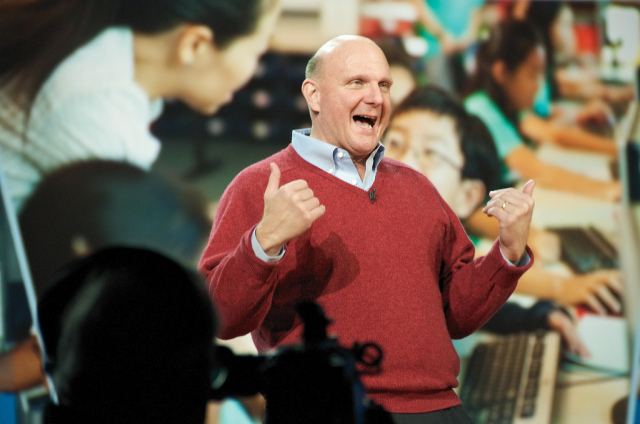
By Emily Chapman of HackCollege.com
FTC Disclosure: Microsoft paid for my trip to New York, my hotel and my food. Blogging is awesome!
It's a weird thing to sit down with a man who's worth $13.1 billion, but on Monday I did just that. As part of the Windows Phone 7 launch at the Microsoft Open House, I had the chance to sit down with Steve Ballmer, CEO of Microsoft, and ask him about the future of Microsoft's relationship with students--especially in light of their release of Windows Phone 7--the future of technology, and what students should be doing to break into tech fields.
 We started off the interview talking about Windows Phone 7, as the press conference about the new phones had happened just a few hours earlier. Ballmer was, unsurprisingly, adamant that he thinks Windows Phone 7 phones are the best choice for college students. He said that user experience with Android phones is patchy -- it's hard to know an Android phone is an Android phone when you pick it up -- and iPhones only offer one model, ignoring that some people might want a QWERTY keyboard or different speakers. He's of the opinion that giving students a "consistently delightful" (yes, that's really the slogan) user experience over a variety of phones will draw them back from competing smartphone options. Whether that's true or not remains to be seen, but for middle-of-the-road users (people who don't want to root their Android phone and who want something more rugged than an iPhone), he may have steered Microsoft towards a winning strategy.
We started off the interview talking about Windows Phone 7, as the press conference about the new phones had happened just a few hours earlier. Ballmer was, unsurprisingly, adamant that he thinks Windows Phone 7 phones are the best choice for college students. He said that user experience with Android phones is patchy -- it's hard to know an Android phone is an Android phone when you pick it up -- and iPhones only offer one model, ignoring that some people might want a QWERTY keyboard or different speakers. He's of the opinion that giving students a "consistently delightful" (yes, that's really the slogan) user experience over a variety of phones will draw them back from competing smartphone options. Whether that's true or not remains to be seen, but for middle-of-the-road users (people who don't want to root their Android phone and who want something more rugged than an iPhone), he may have steered Microsoft towards a winning strategy.
In addition, Ballmer extolled the social focus of the new Windows phones -- they're focused on interacting with Facebook (woo!) and Windows Live (which some people use, I guess). If you add someone to your start page, the icon automatically updates to show their most recent activity, drawing attention to what people are doing in the moment. The phones do seem to do a really good job of treating phones as extensions of people who want to manage their social networks; whether that will be enough to convince students to make the jump -- especially before the phone's gone through a few revisions -- remains to be seen. (If you're considering the switch, be warned that the phones don't have a copy and paste feature.)
Going forward, Ballmer sees computing remaining divided into small, medium and large machines -- phones, tablets (or whatever comes to replace them) and laptops or TV-sized machines. He says that Microsoft's focus is going to be on easy decision making -- he echoed the idea of Bing as a "decision engine." Microsoft's focus will be on connecting people to each other and on entertainment. Ballmer imagines a future where you can shout, "I'm bored! Amuse me!" at a device and go from "zero to entertained." The idea of such a screen-based future is a little depressing, honestly, but if Microsoft can make machines that responsive it will be impressive.
When asked about college education specifically, Ballmer was quick to answer, and it seemed to be as himself rather than as a representative of the company. He said the focus needs to be on expanding the number of people with access to a college education by bringing down costs. The traditional college experience is expensive, and he said developers need to start focusing on ways to lower cost and expand audiences. In addition, he said that there needs to be better preparation for students at the K-12 level -- giving students context and real-world skills on computers to compete with students elsewhere. None of it was groundbreaking, but if Microsoft makes a push for K-12 reform (and the REDU project suggests that they may actually do so), K-12 education in the US might actually improve.
We closed out the interview by asking Ballmer what his advice was for students looking into technology fields. He said, in reference to "The Graduate," that technology is the new plastics. Not surprisingly for a tech company CEO (or someone who's been paying attention to the last 10 years), he was adamant that tech skills are useful not only for those looking to go into programming and engineering, but for those passionate about social justice, and economics, and anything else. He said that tech skills are the most necessary thing for getting your message -- whatever it is -- out to the general public.